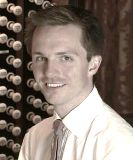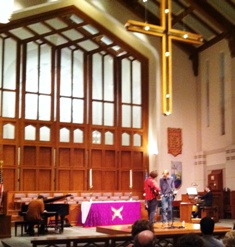MusicNOW 2012 Engages Cincinnati
Mary Ellyn Hutton
Posted: Mar 31, 2012 - 4:27:30 PM in
reviews_2012
Part One. MusicNOW Goes to Church.
If you've never heard banjo with pipe organ, then you didn't attend the March 28 opening concert of MusicNOW 2012 at Christ Church Cathedral in Cincinnati.
Actually, the two go together quite well, as shown on this delightfully eclectic program.
The first half comprised folk music
by Sam Amidon (guitar, banjo, fiddle and vocals). The second half featured James McVinnie,
organist at Westminster Abbey in London.
Amidon was center stage -- center-nave if you will -- for selections including "I See the Sign," "Bright Sunny South" and "Prodigal Son," the latter soulfully sung with Nico Muhly on organ (New York-based Muhly is the featured composer for Music Now VII). Amidon played a mean country fiddle as well, keeping time with his foot to a Kentucky fiddle tune, and his expressive voice was even more compelling in the church's warm acoustics. Joined by McVinnie, violist Nadia Sirota and Muhly, he closed his set with a lusty shape-note song, "O Where is My Little Darlin'."

James McVinnie
|
McVinnie structured the second half with Muhly's O Antiphon Preludes for Organ. Premiered in December, 2010 at Westminster Abbey in London, the Preludes are based on the seven "O" antiphons, used at Vespers during the Advent season. Each is a name for Christ: O Sapentia (Wisdom), O Adonai (Lord), O Radix Jesse (Root of Jesse), O Clavis David (Key of David), O Oriens (Dayspring), O Rex Gentium (King of the Nations) and O Emmanuel (God with Us).
McVinnie sang the plainsong antiphons preceding each Prelude, each of which varied in color and expression. O Adonai, for example, was bright and festive, somewhat reminiscent of the well known Toccata from Widor's Fifth Organ Symphony. O Radix Jesse had a misterioso aspect, while O Clavis David utilized reed stops prominently (an "apocalyptic" touch, McVinnie said).
Interleaved with the Preludes were works by Shara Worden, Arvo Pärt, David Lang,
Richard Reed Parry (of the indie rock band Arcade Fire) and Muhly. Worden's "From the Invisible to the Visible" and Parry's "Echo the Part," were Music Now VII commissions and world premieres. "From the Visible to the Invisible," following O Sapentia, was performed with a skittering accompaniment by Sirota, whose viola was amplified to enhance projection in the large cathedral space. Parry's "Echo the Part," which followed O Clavis David, began in a pleasing, melodic vein, built to a fierce, reedy climax, then grew soft and chilling before ending on a complex chord.
O Adonai was followed by Pärt's Pari Intervallo, a gentle work infused with serenity, while McVinnie inserted an improvisation between O Oriens and O Rex Gentium. Taken together, the music was quintessentially soothing and sent the audience home in a tranquil and relaxed mood.
(to be continued)


